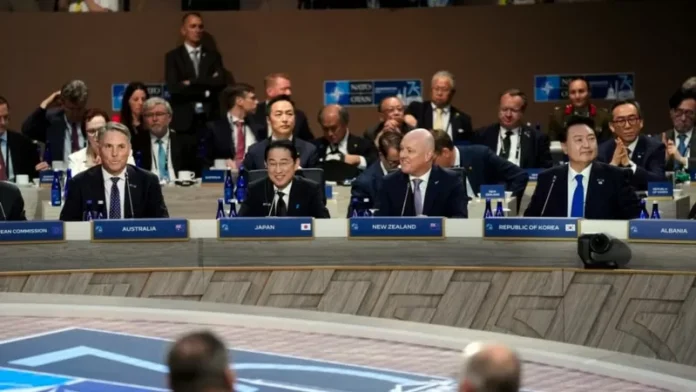Washington – The North Atlantic Treaty Organization (NATO) convened on Thursday to deepen its relationships with key Indo-Pacific partners. High-level leaders from countries such as Australia, Japan, New Zealand, and South Korea came together to address the growing threats in the region. This meeting came just a day after all 32 NATO allies released a strongly worded statement calling out China for its support of Russia’s illegal war against Ukraine.
During the working session, NATO and its Indo-Pacific partners discussed and strengthened strategies to face the various challenges in the Pacific region. These include North Korea’s missile launches and China’s continuous supply of technology and raw materials to Russia, which has allowed President Vladimir Putin to replace his losses on the battlefield.
The attendance of Indo-Pacific partners at this meeting sends a clear message to China that democratic alliances will stand up for the rule of law, no matter where an aggressor may try to break it. According to Jason Israel, National Security Council senior director for defense policy, NATO also recognizes that threats from the Indo-Pacific, including the DPRK and PRC’s support for Russia’s aggression against Ukraine, cannot be ignored.
In the final communique, signed by all 32 allies, NATO referred to China as a “decisive enabler” of Russia’s war and urged Beijing to cease its support. The leaders emphasized that China’s involvement in the conflict negatively impacts its interests and reputation.
NATO also expressed concerns about China’s space capabilities and nuclear arsenal. Secretary-General Jens Stoltenberg stated in a press conference on Wednesday that “China is propping up Russia’s war economy” and increasing the threat to Europe’s and NATO’s security.
He added, “China provides dual-use equipment, microelectronics, and other tools that enable Russia to build missiles, bombs, aircraft, and weapons to attack Ukraine.”
When asked by VOA if the statement was a strong enough message to deter China from supporting Russia, Stoltenberg replied, “This is the strongest message that NATO allies have ever sent regarding China’s contributions to Russia’s illegal war against Ukraine.”
Some allies cautioned the alliance against using the narrowly worded communique to paint NATO as “anti-China.” Hungarian Foreign Minister Peter Szijjarto, speaking to Hungarian state television on the sidelines of the summit, stated that “NATO is a defense alliance, and we cannot turn it into an anti-China bloc.”
However, defense expert Bradley Bowman, the senior director for the Foundation for Defense of Democracies’ Center on Military and Political Power, believes that NATO was long overdue in calling out China.
“Europeans are dying in Europe in a war of aggression from the Kremlin with the support of Iran, North Korea, and China,” he stated.
During the summit, US President Joe Biden emphasized that NATO must counter Russia’s increased defense production, made possible by help from China, North Korea, and Iran. He urged the alliance to continue investing in Ukraine’s and NATO’s own defense production to prevent falling behind.
“We cannot allow the alliance to fall behind,” Biden said.
China maintains that it does not provide military aid to Russia, despite maintaining strong trade ties with Moscow.
On Monday, Chinese Foreign Ministry spokesperson Lin Jian accused NATO of “breaching its boundary, expanding its mandate, reaching beyond its defense zone, and stoking confrontation.”
The Indo-Pacific region is facing numerous challenges, and it is imperative for democratic countries to come together and address them. The meeting between NATO and its Indo-Pacific partners is a step in the right direction. It sends a clear message to China that democratic alliances will not tolerate its support for aggression and that they will stand up for the rule of law.
NATO’s strong stance against China’s involvement in Russia’s illegal war against Ukraine is a significant development. It is time for the international community to recognize the role that China plays in fueling conflicts and destabilizing regions.
Furthermore, the concerns raised about China’s space capabilities and nuclear arsenal highlight the need for increased vigilance and cooperation among democratic nations. As NATO continues to invest in its defense capabilities, it is crucial for China to realize that its actions have consequences and that it must act responsibly on the global stage.
In conclusion, the NATO summit has served as a platform to strengthen relationships among democratic nations and address the challenges in the Indo-Pacific region. The meeting has sent a powerful message to China that its support for aggression will not be tolerated. As NATO and its partners continue to work towards a more secure and stable world, it

